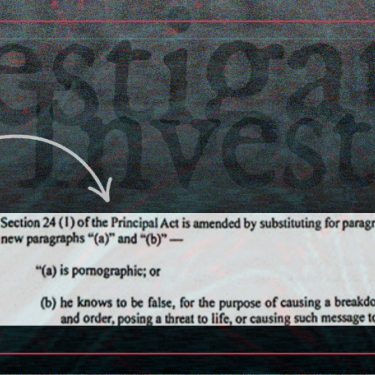Nigeria: at least eight journalists prosecuted under cybercrime law despite new amendment

At least eight journalists have been arrested, prosecuted, or detained under Nigeria’s Cybercrimes Act since the amendment of its articles that violated press freedom seven months ago. Reporters Without Borders (RSF) condemns the misuse of this legislation to persecute journalists and calls on the authorities to guarantee that reporters can work safely.
The Cybercrimes Act continues to threaten investigative journalism in Nigeria. Despite modest attempts to promote press freedom by amending some of its articles on February 28, at least eight journalists have been improperly prosecuted, arrested or detained under the legislation in the past seven months.
"The failure to comply with the law’s new provisions -– which remain problematic due to vague wording – highlights the authorities' intention to gag the investigative journalism uncovering corruption and governance issues in Nigeria. This public interest work must be protected. Amending the cybercrime law was a positive step, yet its application is not yet guaranteed. RSF calls on the authorities to respect the amended law, and invites them to work with local organizations to improve the protection of journalists."
The law, adopted in 2015, was amended last February, with notable updates to Article 24. Regularly used to arrest journalists working online, the Court of Justice of the Economic Community of West African States (ECOWAS) ruled the Cybercrimes Act incompatible with the African Charter on Human and Peoples' Rights in 2022.
In July, Parliament committed to taking measures to guarantee press freedom, with a motion brought forth by MP Clement Jimbo of the presidential party. When contacted by RSF, Jimbo assured that the Cybercrime Act has not posed a problem since its amendment, and points a finger at “the security agencies relying on the Cybercrime Act of 2015 without knowing the amendment made in 2024.” An insufficient excuse for Khadijah El-Usman from the Nigerian NGO Paradigm Initiative, who believes “the question is then, who determines what content ‘to cause a breakdown of law and order’ [sic], if not those in power able to abuse and misinterpret the section.”
In fact, despite the erasure of certain repressive passages, this article still allows for heavy penalties: up to three years imprisonment for “any person who knowingly or intentionally sends a message or other matter by means of computer systems or network that [...] he knows to be false, for the purpose of causing a breakdown of law and order, posing a threat to life or causing such messages to be sent.” This vague text is still used to unfairly prosecute journalists, particularly those who regularly publish investigative reports implicating political or institutional forces.
Abusive arrests, prosecutions and detentions
Last May, Daniel Ojukwu, an investigative journalist with the Foundation for Investigative Journalism (FIJ), was accused of violating this law and detained for ten days after publishing an investigation into alleged embezzlement by an employee of former President Muhammadu Buhari. When Ojukwu was released on bail, the police confiscated his passport, which has yet to be returned.
The same month, officers from the Nigerian Police Force National Cybercrime Centre (NPF-NCC) interrogated two employees from the International Centre for Investigative Journalism (ICIR), executive director Dayo Aiyetan and journalist Nurudeen Akewushola, for nine hours in an attempt to find out who their sources were. The journalists had been investigating alleged corruption by two former police inspectors-general. More recently, on 14 August, FIJ editor Fisayo Soyombo was questioned for several hours by the NPF-NCC before being released on bail conditions. Bukky Shonibare, Chair of the FIJ Board, was also interrogated by the NPF-NCC in March 2024.
At least three other journalists have been wrongfully arrested, prosecuted or detained under this cybercrime law: Ibraheem Hamza Mohammed of the privately-owned media FirstNews, Kobo Robson of The Waves newspaper and Precious Eze, a journalist working for the online outlet News Platform who spent 18 days in detention in May. For the latter two reporters, the cybercrime charge was dropped during the proceedings and replaced by other charges under federal and local law.
